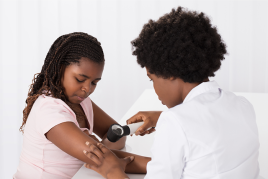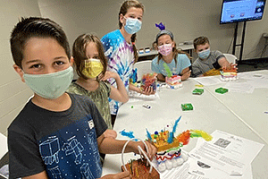Skin cancer types: Merkel cell carcinoma causes
Who gets Merkel cell carcinoma?
Merkel cell carcinoma (MCC) is rare, which makes it harder to study. For this reason, scientists are still not entirely sure what causes it. They have learned a lot, however, by looking at cancer records.
It’s through cancer records that they discovered the people most likely to get MCC have all the following traits:
Male
65 years of age or older
Fair skin that may burn or freckle when exposed to the sun
Seldom used sunscreen, clothing, or shade to protect their skin from the sun
This finding has given scientists insight into what may cause this rare skin cancer. It appears that sunlight and a weakened immune system play key roles.
A virus may also play a role in causing MCC.
The following explains why scientists believe each of these (sunlight, a weakened immune system, and a virus) may play a role in causing MCC.
Risk increases with age
The risk of developing Merkel cell carcinoma increases with age, and people who are older than 65 years of age have the greatest risk.1

What causes Merkel cell carcinoma?
Sunlight
The body tries to repair this damage. Over the years, the damage becomes more than the body can handle. This leads to changes (mutations) in our skin’s cells. As the mutations build up, skin cancer can develop.
It seems clear that the sun’s UV light plays a role in causing MCC. This skin cancer is most common in fair-skinned men who rarely protected their skin from the sun.
We also know that more people are diagnosed with MCC in Hawaii, which has the strongest UV light in the United States, than in any other state. Worldwide, Australia, which receives intense UV light, has the greatest number of people who develop MCC.
More evidence that UV light plays a role in causing MCC comes from this finding. People who have psoriasis and receive a treatment called PUVA (psoralen plus UVA light) have a 100 times greater risk of developing MCC than do other people.
If you have psoriasis and treat it with PUVA, it’s important to keep in mind that MCC is very rare.
Weak immune system
Are older than 65 years of age
Take certain medications, such as medication that suppresses the immune system in order to prevent the body from rejecting a transplanted organ
Live with a condition that significantly weakens the body’s immune system, such as HIV or AIDS
It may seem strange that our age affects our immune system. Scientists have found that as we age, our immune system gradually declines. We get infections more easily. Vaccines may not work as well as they did when you were younger.
It’s believed that a weakening immune system is the reason MCC usually develops after 65 years of age and why the risk of developing this skin cancer continues to increase with age.
MCC rarely develops in young people.
Merkel cell polyomavirus (MCP)
A weakened immune system
The MCP virus
As they continued to study this virus, scientists learned that between 60% and 80% of Americans carry this virus. Testing shows that it can live on our skin, in our urine, and inside our nose without causing a health problem. We now know that most Americans become infected with this virus as a child, usually by 4 or 5 years of age.
What scientists want to know is why so many people carry this virus, yet so few people get MCC. It may be that the years of UV damage to the skin and a weakened immune system cause the virus to mutate (change). These changes to the virus may cause MCC. More research is needed find out whether this happens.
Scientists also want to know why Australians who get MCC rarely have the MCP virus inside their MCC tumor, and why most Americans do.
While there are still plenty of questions to be answered, the discovery that that the immune system plays a key role in MCC is changing the way this cancer is treated. Newer treatments that help the immune system find and destroy cancer cells have become a treatment option for advanced MCC, and researchers continue to study new treatments.
You can learn about this and other treatments for MCC at, Merkel cell carcinoma: Diagnosis and treatment.
1 Paulson KG, Park SY, et al. “Merkel cell carcinoma: Current US incidence and projected increases based on changing demographics.” J Am Acad Dermatol 2018;78:457-63.
Image
References
Tello, TL. Coggshall K, et al. “Merkel cell carcinoma: An update and review Current and future therapy.” J Am Acad Dermatol. 2018;78:445-54.
 Molluscum contagiosum: How to safely treat it
Molluscum contagiosum: How to safely treat it
 Biosimilars: 14 FAQs
Biosimilars: 14 FAQs
 Practice Safe Sun
Practice Safe Sun
 Relieve uncontrollably itchy skin
Relieve uncontrollably itchy skin
 Fade dark spots
Fade dark spots
 Untreatable razor bumps or acne?
Untreatable razor bumps or acne?
 Laser hair removal
Laser hair removal
 Scar treatment
Scar treatment
 Botox
Botox
 Free materials to help raise skin cancer awareness
Free materials to help raise skin cancer awareness
 Dermatologist-approved lesson plans, activities you can use
Dermatologist-approved lesson plans, activities you can use
 Find a Dermatologist
Find a Dermatologist
 What is a dermatologist?
What is a dermatologist?